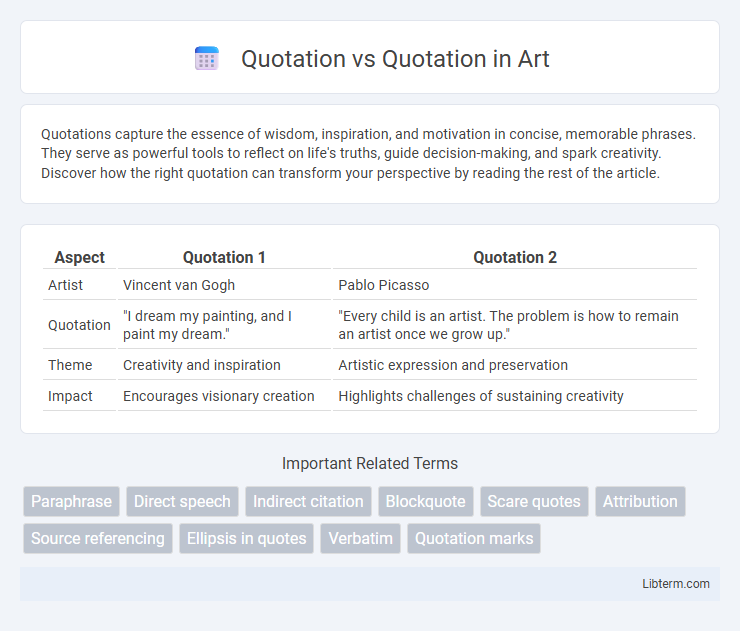Quotations capture the essence of wisdom, inspiration, and motivation in concise, memorable phrases. They serve as powerful tools to reflect on life's truths, guide decision-making, and spark creativity. Discover how the right quotation can transform your perspective by reading the rest of the article.
Table of Comparison
| Aspect | Quotation 1 | Quotation 2 |
|---|---|---|
| Artist | Vincent van Gogh | Pablo Picasso |
| Quotation | "I dream my painting, and I paint my dream." | "Every child is an artist. The problem is how to remain an artist once we grow up." |
| Theme | Creativity and inspiration | Artistic expression and preservation |
| Impact | Encourages visionary creation | Highlights challenges of sustaining creativity |
Understanding the Term "Quotation
Quotation refers to the exact repetition of someone else's spoken or written words, often used to provide evidence or support in a discussion. Understanding the term "quotation" involves recognizing its role in accurately conveying original meaning and giving proper credit to the source, which is crucial in academic writing and journalism. Proper quotation practices prevent plagiarism and enhance the credibility of a text by transparently acknowledging the work of others.
Different Contexts of "Quotation
Quotation refers to the act of repeating or citing someone else's words verbatim, commonly used in academic writing to support arguments or in literature to convey authenticity. In business contexts, a quotation denotes a formal statement of price for goods or services, often provided to potential customers before a purchase. Understanding the distinct uses of quotation--verbatim textual citation versus pricing proposal--ensures clarity in communication across academic, literary, and commercial environments.
Quotation in Literary Works
Quotation in literary works involves directly citing passages from original texts to support analysis or interpretation, preserving the author's exact language and stylistic nuances. Literary quotations enhance credibility and provide concrete evidence for themes, character development, or narrative techniques. Effective use of quotations requires careful integration within the writer's argument, ensuring clarity and maintaining the flow of the literary critique.
Quotation in Business and Commerce
Quotation in business and commerce refers to a formal statement provided by a seller or service provider detailing the price and terms for specific goods or services. It serves as a legally binding offer that outlines costs, quantities, and delivery timelines, facilitating transparent negotiations between buyers and sellers. Accurate quotations help businesses manage budgeting, procurement, and contract agreements efficiently.
Key Differences Between Types of Quotations
Quotation marks enclose direct speech or text, while block quotations format extended excerpts typically over 40 words, indented without quotation marks. Quotation marks are used for brief citations or dialogue within running text; block quotations visually separate longer passages for emphasis or clarity. Understanding the distinction ensures precise attribution and proper formatting in academic and professional writing.
How to Properly Use Quotations in Writing
Properly using quotations in writing involves accurately reproducing the original text and enclosing it within quotation marks to indicate a direct citation. Integrate quotations seamlessly by providing context, attributing the source, and ensuring relevance to your argument or analysis. Maintain clarity and avoid overuse to preserve your own voice while enhancing credibility and supporting evidence.
Common Misconceptions About Quotations
Many people mistakenly believe that quotations must always be exact replicas of the original text, overlooking the acceptable use of paraphrasing or summarizing within certain contexts. Another common misconception is that quotations require no citation, whereas proper attribution to the original author is essential to avoid plagiarism. Furthermore, some assume that longer quotations are more credible, while concise, well-integrated quotes often provide clearer support for arguments.
Importance of Accurate Quotation Usage
Accurate quotation usage ensures the original meaning and intent of the speaker or author is preserved, maintaining credibility and integrity in communication. Precise quotations enable clear attribution, prevent misinterpretation, and uphold ethical standards in academic, legal, and professional contexts. Misquoting can lead to misinformation, damage reputations, and result in loss of trust or legal consequences.
Quotation Mark Conventions and Formatting
Quotation mark conventions dictate the precise placement and usage of marks to distinguish direct speech, titles, or cited material in written text. American English typically uses double quotation marks (" ") for primary quotes and single marks (' ') for quotes within quotes, while British English often reverses this convention. Proper formatting includes placing punctuation marks like periods and commas inside quotation marks in American style, whereas British style places them outside unless they are part of the quoted material.
Best Practices for Citing Quotations
When citing quotations, it is essential to accurately attribute the original author and provide precise source details to maintain credibility and avoid plagiarism. Best practices include using quotation marks for direct quotes, integrating citations following style guidelines such as APA, MLA, or Chicago, and ensuring the quoted material is relevant and enhances the argument or analysis. Proper citation also involves balancing direct quotes with paraphrasing to maintain the writer's unique voice while respecting intellectual property.
Quotation Infographic

 libterm.com
libterm.com